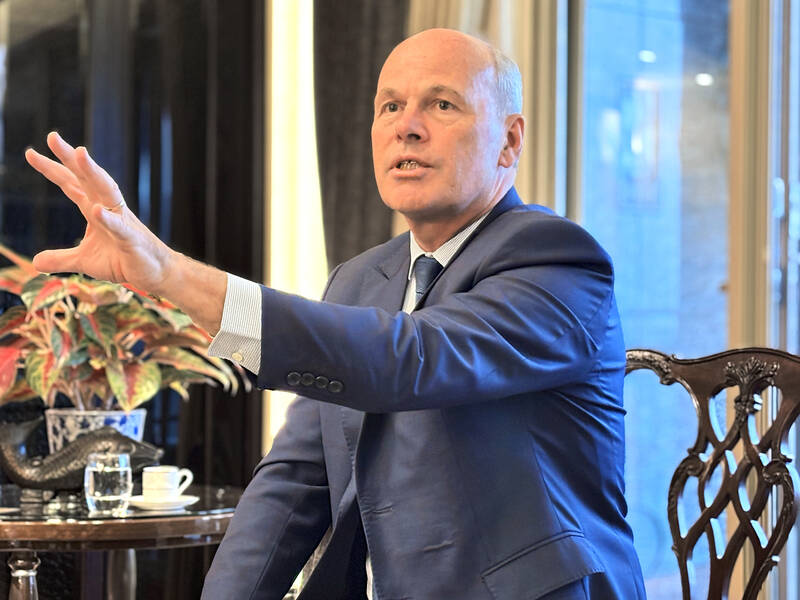Canada is to maintain its Indo-Pacific strategy, even if the country elects a new government later this year, and would remain a strong partner of Taiwan, Canada’s representative to Taipei said on Wednesday.
“My expectation is, Canada will, of course, continue with its Indo-Pacific strategy, and Taiwan’s place in that Indo-Pacific strategy will remain important,” said Jim Nickel, executive director of the Canadian Trade Office in Taipei.
“As described in the strategy itself now, we will continue with our strong partnership with Taiwan,” he said at a media event when asked about a potential change of government later this year and how that might affect his country’s relations with Taiwan.

Photo: CNA
Canadian Prime Minister Justin Trudeau announced earlier this month that he was stepping down as leader of the Liberal Party of Canada.
He would remain as prime minister in a caretaker capacity until the party selected a new leader.
The party’s nationwide process of choosing a new leader is expected to conclude on March 9, while Canada’s general elections are mandated to be held on or before Oct. 20.
The Canadian government’s Indo-Pacific strategy, released in November 2022, says that the nation would invest resources in deepening engagement with free and democratic partners in the Indo-Pacific region, including Taiwan, and would oppose unilateral actions that threaten the “status quo” in the Taiwan Strait.
“China is an increasingly disruptive global power,” the document says.
Canada would balance its approach to China with diversified investments in regional relationships, including working with Indo-Pacific partners to push back against any unilateral actions that threaten the “status quo” in the Taiwan Strait and the East and South China Seas, the document says.
It mentions Taiwan multiple times, saying that Canada would maintain its multifaceted engagement with Taiwan and would continue to foster economic and people-to-people ties with Taiwan while supporting Taiwan’s resilience.
Nickel on Wednesday said that Taiwan would be a good addition to the Comprehensive and Progressive Agreement for Trans-Pacific Partnership (CPTPP), which it has applied to join.
Asked about Taiwan’s application to join the CPTPP, Nickel said that when Canada was CPTPP commission chair last year, there were “very good conversations about all the applicants to the CPTPP, including Taiwan.”
Canada is very pleased that Taiwan remains interested and committed to joining the regional trade bloc, Nickel said.
“Canada believes that Taiwan would make a very good addition to the CTPPP, given Taiwan’s commitment to rules-based trade, and of course, the high value that Taiwanese industry contributes to the global economy,” he said.
During an annual CPTPP summit in Vancouver in November last year, the members of the trade bloc failed to reach an agreement to initiate an accession process for Taiwan or China.
However, the CPTPP members decided to commence the initiation process for Costa Rica, which had applied in August 2022 to join the bloc, a year after Taiwan and China did.
China applied for CPTPP membership about a week earlier than Taiwan.
The CPTPP represents about 15 percent of the global economy.
It has 12 members: Australia, Brunei, Canada, Chile, Japan, Malaysia, Mexico, New Zealand, Peru, Singapore, Vietnam and the UK.

Former president Tsai Ing-wen (蔡英文) on Monday called for greater cooperation between Taiwan, Lithuania and the EU to counter threats to information security, including attacks on undersea cables and other critical infrastructure. In a speech at Vilnius University in the Lithuanian capital, Tsai highlighted recent incidents in which vital undersea cables — essential for cross-border data transmission — were severed in the Taiwan Strait and the Baltic Sea over the past year. Taiwanese authorities suspect Chinese sabotage in the incidents near Taiwan’s waters, while EU leaders have said Russia is the likely culprit behind similar breaches in the Baltic. “Taiwan and our European

Taiwanese indie band Sunset Rollercoaster and South Korean outfit Hyukoh collectively received the most nominations at this year’s Golden Melody Awards, earning a total of seven nods from the jury on Wednesday. The bands collaborated on their 2024 album AAA, which received nominations for best band, best album producer, best album design and best vocal album recording. “Young Man,” a single from the album, earned nominations for song of the year and best music video, while another track, “Antenna,” also received a best music video nomination. Late Hong Kong-American singer Khalil Fong (方大同) was named the jury award winner for his 2024 album

Hong Kong singer Eason Chan’s (陳奕迅) concerts in Kaohsiung this weekend have been postponed after he was diagnosed with Covid-19 this morning, the organizer said today. Chan’s “FEAR and DREAMS” concert which was scheduled to be held in the coming three days at the Kaohsiung Arena would be rescheduled to May 29, 30 and 31, while the three shows scheduled over the next weekend, from May 23 to 25, would be held as usual, Universal Music said in a statement. Ticket holders can apply for a full refund or attend the postponed concerts with the same seating, the organizer said. Refund arrangements would

The Taipei District Court sentenced babysitters Liu Tsai-hsuan (劉彩萱) and Liu Jou-lin (劉若琳) to life and 18 years in prison respectively today for causing the death of a one-year-old boy in December 2023. The Taipei District Prosecutors’ Office said that Liu Tsai-hsuan was entrusted with the care of a one-year-old boy, nicknamed Kai Kai (剴剴), in August 2023 by the Child Welfare League Foundation. From Sept. 1 to Dec. 23 that year, she and her sister Liu Jou-lin allegedly committed acts of abuse against the boy, who was rushed to the hospital with severe injuries on Dec. 24, 2023, but did not